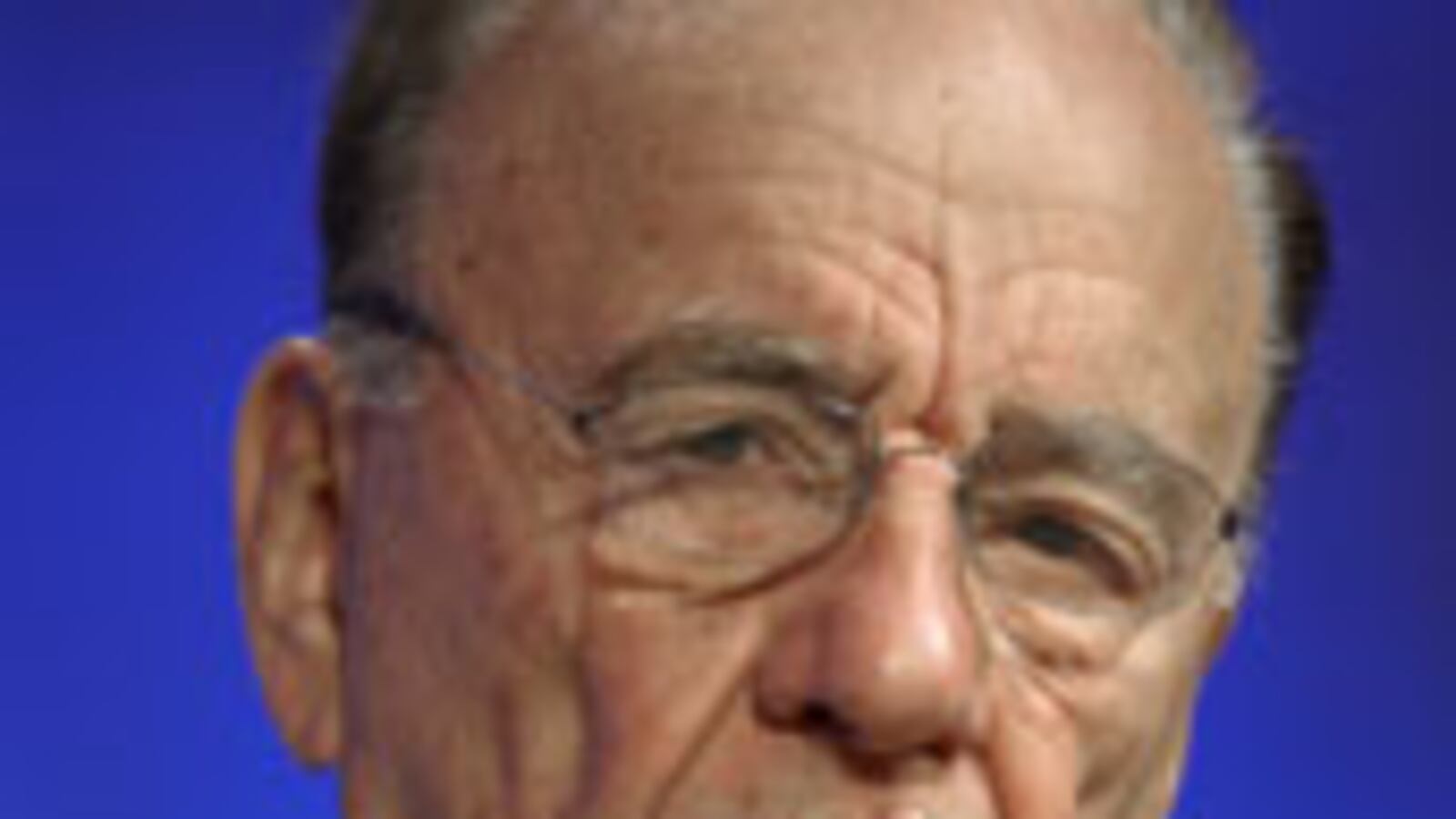
Rupert Murdoch is the greatest media owner in history because he built a little company into a huge one, cracked the outrageous London print unions, broke up the three-network US television cartel, pioneered the vertically integrated media conglomerate and satellite television, and created the multi-continental media company. These are colossal achievements and an interesting story, but Michael Wolff’s The Man Who Owns The News is a very uneven read.
The author starts out in Charlie Rose mode (he describes Rose as "a deferential and often treacly host") and speculates that Murdoch enjoyed their interviews as much as he did. I doubt it. Wolff wades through a confusing and clichéd account of Murdoch's life, replete with factual errors, serious omissions, mind-reading suppositions, extreme psychological liberties, and the conclusion that Murdoch will be "temperamentally compelled" to try to acquire The New York Times and buys newspapers "to change himself." I don't think so.
Wolff claims Murdoch will be "temperamentally compelled" to try to acquire The New York Times and buys newspapers "to change himself." I don't think so.
We are told by Wolff that Murdoch derived great "fun" from newspapers, but elsewhere that he is joyless, shy, hard of hearing, mumbles incomprehensibly, "unimpressive," and dislikes social contact; still elsewhere we are warned of his "deadly charm." Apart from being contradictory, these descriptions are much exaggerated.
To be fair, Wolff is correct that Murdoch is very perceptive about people. I once asked him what he thought of President Reagan; after a few seconds, he said: "He is a cunning, charming, old peasant." We used to compare views of newspaper people, and if an employee or ex-employee had an overbearing spouse or was too preoccupied with a pastime or a public policy issue, he always picked it up even on minimum exposure. The author accurately imputes the opinion to Murdoch that journalists are "weak, self indulgent and…absolutely sanguine about wasting his money," and adds for his own account that the media’s “shameless self-promoters, so without a moral center…and motivated by their own grandiosity and need for attention… have bankrupted the culture.” (These are tenable assessments, but Wolff doesn't reassure the reader that he is exempt from some of these criticisms himself. And Murdoch, as Wolff points out extensively, has lowered rather than raised journalistic standards.)
It is also true that Murdoch uses his media to further his political and business objectives and to attack his enemies. There is nothing wrong with that, but losses of $1 million a week each at the New York Post and Times of London, for decades, is a high price to lay off on a public company for what he described to me as "psychic income." Indeed, Murdoch does not subscribe to the fraud that the best management leaves the working press to do what it wants with their employers' property; and Murdoch is, as Wolff writes, in sum, "a manipulative bastard" who believes in nothing except himself and his company, and eventually double-crosses almost everyone.
But Wolff also tells us that "two thirds of [Murdoch's] mind" is on newspapers; that Harold Evans, whom he fired as editor of The Times of London, was “really angry at himself”; and that Murdoch, with Ronald Reagan and Margaret Thatcher, was one of the world "value triumvirate" of the '80s. That honor usually goes to Pope John Paul II. These assertions, and many like them, are bunk.
Among the references to me, Wolff claims that Murdoch, in effect, won the London broadsheet price war, which he did not. He started to restore cover prices, never came close to catching The Daily Telegraph, which was his objective, and lost hundreds of millions of dollars trying. Wolff takes up some of the News Corporation libels against me and alleges that that war caused me to steal huge amounts of money from our company to finance an unaffordable, extravagant standard of living. (The related counts were unfounded and were all acquittals at trial.) Wolff also claims in two places that there was an arrangement between Murdoch and me by which News Corp. would lay off my legal travails and we wouldn't criticize the elevation of his son James to be head of Sky Broadcasting.
In fact, News Corp. attacked me as viciously as I have ever seen in 40 years in the media, except for a few foreign dictators, and I told our business writers that Murdoch had a perfect right to put anyone he wanted in charge of his business units. I didn't need a quid pro quo to avoid attacking the young Murdochs. My last contact with him was an exchange in which I asked him to be a little restrained, and reminded him that I had publicly spoken in his favor at the London Media Society during his financial crisis and publicized my own comments in the Telegraph (for which he thanked me effusively). He wrote back promptly that he would keep an eye on it, but his outlets only became nastier, and vastly exceeded the eventual mendacity of the lawless prosecutors, who lost 85 percent of their case, and the rest is on appeal.
Moreover, the author of a business book should be, but in this case isn't, aware that Dow Jones, The New York Times, and The Washington Post are immune to hostile takeovers because of a two-tiered share voting structure; that it is not the case that media companies were not “respectable on military-industrial-complex-biased Wall Street” (where did Wolff unearth that canard?); that the London Sun did not owe its 4 million daily circulation almost entirely to coverage of Princess Diana; that it is not true that "Murdoch knew beans about television" after he had been in the business for 30 years; and that he knew nothing of satellite telecasting either, even after he had made billions in that business.
He omits Murdoch's bid for MGM in 1990, which, if successful, would have bankrupted his company; omits any reference to the more than $1 billion he lost in TV Guide; seems unaware that MCI's $2 billion shareholding in News Corp. was in non-voting shares; and mistakenly thinks that preferred shares are not considered to be equity in the US. He spends five pages disparaging Murdoch's purchase of Laurance Rockefeller's apartment, but squeezes into four scattered paragraphs the fact that his entire company almost crashed into bankruptcy in 1990-91. Wolff unintentionally banners the widespread incompetence of reporters whom he elsewhere joins Murdoch in excoriating.
In style and organization, this is an irritating book. We keep skipping back and forth between little, then chubby, then slender, and finally gaunt Rupert, to the Dow Jones takeover, which Wolff represents as the capstone of Murdoch's career. It is not such a triumph to overpay by $3 billion on a $5 billion deal. If sentences containing "iconic," transformative," "ridiculous," "being and nothingness," "fragile construct," and suspended endings ("well...") were omitted, the book would be at least 20 pages shorter. If Wolff must use French words and phrases, he should at least know their meanings and genders. There is not and never has been a "haute monde.” There are too many sentences without verbs, too many stubby sentences that sound like a parody of Hemingway in Green Hills of Africa. While I have no objection to coarse language, over-frequent and unnecessary use of it is self-indulgent and grating.
Finally, the endless prattle about succession and the politics between Murdoch's offspring and senior executive is just tittle-tattle, neither believable nor of much interest. The younger Murdochs are bright and attractive people, his executives are capable, and they will all work it out. Personally, Rupert Murdoch is quite pleasant, though he is also one of the very few completely ruthless and totally cynical people I have known. (I think The Simpsons reflects his worldview: Public officials are crooks and the people are idiots.) And as Wolff tells us, he now has orange hair and his idea of riotous amusement is a scatological answer to a question about the difference between taking meat from a refrigerator and withdrawing from anal sex.
Murdoch fits Clarendon's description of Cromwell, updated by David Chandler to describe Napoleon, as "a great, bad man." He once telephoned me to complain that the editor of The Daily Telegraph had referred to him as "evil." I asked the editor to moderate it a bit. An authoritative biography of Rupert Murdoch, and he certainly deserves one, will have to address that possibility.
Conrad Black is the author of biographies of Maurice Duplessis, Franklin D. Roosevelt, and Richard M. Nixon, was the publisher of the London Telegraph newspapers and Spectator, and founded the National Post of Canada. He has been a life peer in the British House of Lords as Lord Black of Crossharbour since 2001.





